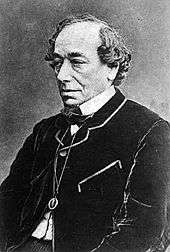United Kingdom general election, 1874
United Kingdom general election, 1874

|
| 31 January–17 February 1874 |
|
|
|
|
|
The 1874 United Kingdom general election saw the incumbent Liberals, led by William Ewart Gladstone, lose decisively, even though it won a majority of the votes cast. Benjamin Disraeli's Conservatives won the majority of seats in the House of Commons, largely because they won a number of uncontested seats. It was the first Conservative victory in a General Election since 1841. Gladstone's decision to call an election surprised his colleagues, for they were aware of large sectors of discontent in their coalition. For example, the nonconformists were upset with education policies; the working class disliked the new trade union laws and the restrictions on drinking. The Conservatives were making gains in the middle-class, Gladstone wanted to abolish the income tax, but failed to carry his own cabinet. The result was a disaster for the Liberals, who dropped from 387 MPs to only 251. Conservatives jumped from 271 to 342. For the first time the Irish Nationalists gained seats, returning 59. Gladstone himself noted, "We have been swept away in a torrent of gin and beer."[1]
The election also saw Irish nationalists in the Home Rule League become the first significant third party in Parliament. This had been the first General Election that used a secret ballot following the 1872 Secret Ballot Act. The Irish Nationalist gains could well be attributed to the effects of the secret ballot as tenants faced less of a threat of eviction if they voted against the wishes of their landlords.
This is the only time since the introduction of the secret ballot that a party has been defeated despite receiving an absolute majority of the popular vote. This was primarily because over 100 Conservative candidates were elected unopposed. This meant that there was no contest in many constituencies where the Conservatives were popular.
Results
| UK General Election 1874 |
|
Candidates |
Votes |
| Party |
Standing |
Elected |
Gained |
Unseated |
Net |
% of total |
% |
№ |
Net % |
| |
Liberal |
489 |
242 |
|
|
− 139 |
37.1 |
52.0 |
1,281,159 |
− 9.5 |
| |
Conservative |
507 |
350 |
|
|
+ 79 |
53.7 |
44.3 |
1,091,708 |
+ 5.9 |
| |
Home Rule |
80 |
60 |
0 |
0 |
+ 60 |
9.2 |
3.7 |
90,234 |
N/A |
| |
Others |
4 |
0 |
0 |
0 |
0 |
|
0.0 |
2,936 |
0.0 |
Total votes cast: 2,466,037. "Others" include the Catholic Union.
Voting summary
| Popular vote |
|---|
|
|
|
|
|
| Liberal |
|
51.95% |
| Conservative |
|
44.27% |
| Home Rule |
|
3.66% |
| Others |
|
0.12% |
Seats summary
| Parliamentary seats |
|---|
|
|
|
|
|
| Liberal |
|
37.12% |
| Conservative |
|
53.68% |
| Home Rule |
|
9.2% |
Regional Results
Great Britain
| Party |
Seats |
Seats change |
Votes |
% |
% Change |
|---|
|
Conservative |
319 |
|
1,000,006 |
44.6 |
|
|
Liberal |
232 |
|
1,241,381 |
55.4 |
|
|
Others |
0 |
|
2 |
0.0 |
|
| Total |
551 |
|
2,241,389 |
100 |
|
England
| Party |
Seats |
Seats change |
Votes |
% |
% Change |
|---|
|
Conservative |
280 |
|
905,239 |
46.2 |
|
|
Liberal |
171 |
|
1,035,268 |
53.8 |
|
|
Others |
0 |
|
2 |
0.0 |
|
| Total |
451 |
|
1,940,509 |
100 |
|
Scotland
| Party |
Seats |
Seats change |
Votes |
% |
% Change |
|---|
|
Liberal |
40 |
|
148,345 |
68.4 |
|
|
Conservative |
18 |
|
63,193 |
31.6 |
|
| Total |
58 |
|
211,538 |
100 |
|
Wales
| Party |
Seats |
Seats change |
Votes |
% |
% Change |
|---|
|
Liberal |
19 |
|
57,768 |
60.9 |
|
|
Conservative |
14 |
|
31,574 |
39.1 |
|
| Total |
33 |
|
89,342 |
100 |
|
Ireland
| Party |
Seats |
Seats change |
Votes |
% |
% Change |
|---|
|
Home Rule |
60 |
New |
90,234 |
39.6 |
New |
|
Irish Conservative |
31 |
 6 6 |
91,702 |
40.8 |
 1.1% 1.1% |
|
Liberal |
10 |
 56 56 |
39,778 |
18.4 |
 39.5% 39.5% |
|
Other |
0 |
|
2,934 |
1.2 |
|
| Total |
101 |
 2 2 |
224,648 |
100 |
|
Universities
All University candidates were elected unopposed.
Notes
- ↑ Martin Roberts, Britain: 1846-1964: The Challenge of Change (Oxford University Press, 2001) p 332
Further reading
- F. W. S. Craig, British Electoral Facts: 1832-1987
- Hurst, Michael. "Liberal versus Liberal: The General Election of 1874 in Bradford and Sheffield." Historical Journal 15#4 (1972): 669-713.
- Maehl, William Henry. "Gladstone, the Liberals, and the Election of 1874" Historical Research 36.93 (1963): 53-69.
- Rallings, Colin, and Michael. Thrasher British Electoral Facts 1832-1999, compiled and edited by (Ashgate Publishing Ltd 2000


